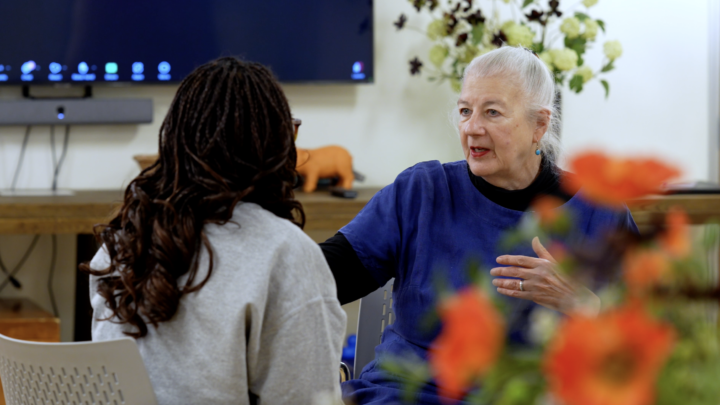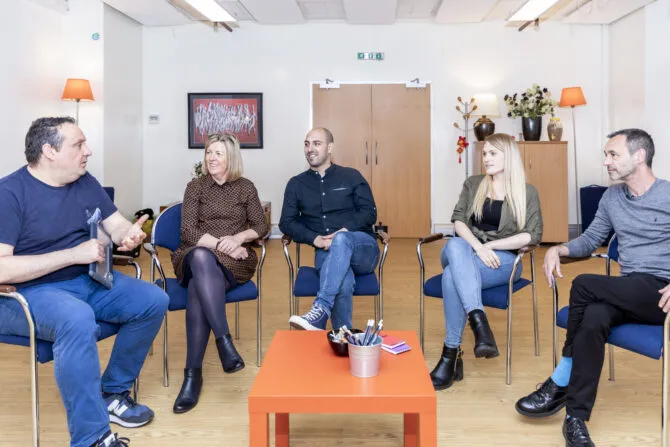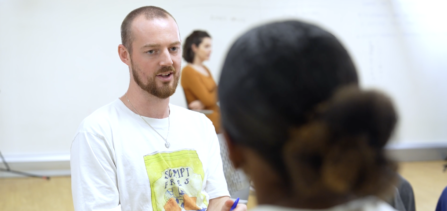Conflict Management and Difficult Conversations Course
A practical conflict management course that gives you the tools to handle any business conflict with confidence and skill.
- Maximum 8 Delegates
- Top Quality Trainers
- Money Back Guarantee
Excellent - built around what I and other attendees needed, sharing useful structures and practice opportunities to help us think about conflict management in a more structured way, and give tools to work on!
This Conflict Management Course helps you with
Working With Difficult People
Resolving Conflict at Work
Using Honesty And Agreement
Conflict Risk Assessment
Remaining Calm in Conflict Situations
Turning Arguments Into Discussions
Defusing Blame
Delivering Bad News
Feeding The Solution
Choosing Appropriate Conflict
Creating Win-Win Outcomes
Achieving an Effective Conflict Resolution Strategy

Book this Conflict Management and Difficult Conversations Course
This course is only available as one-to-one skills training.
Please contact us to discuss further options.
If you want to book 4 or more people on to a single course, please contact us:
Location
London Training Rooms,Suite 121
Business Design Centre,
52 Upper Street,
London, N1 0QH
Running time
{{courses[0].StartTime | formatTime}} - {{courses[0].EndTime | formatTime}}
Course Overview
The Impact Factory conflict management course combines proven theory with practical exercises. You’ll role-play scenario-based difficult conversations designed to help you resolve conflict.
You will learn to change your approach to conflict management in business. You will learn to create positive outcomes through what you do, what you say and how you say it.
Even if situations are challenging, this comprehensive conflict resolution training will help you take control of what happens.

Course Benefits
This Conflict Management and Difficult Conversations Course is limited to 8 delegates, ensuring personal attention to everyone on the course.
Top quality trainers means a total focus on you.

Conflict Management and Difficult Conversations Course
DAY ONE:
Learn to change what you do and say to create better outcomes
- Difficult Conversations
- What is Conflict For?
- Resolution
- Maintaining Relationships
- Dealing with Conflict
- Moment of Choice
- Difficult People
- What Might Happen?
- Where Are You Difficult?
- Avoidance
- Moving Forward
- Their Point of View
- Emotion vs Objectivity
- Empathy
- Avoiding Blame
- Hidden Agendas
- Difficult Messages
- Maintaining Relationships
- Defusing Phrases
- Letting Go
Course content
Introduction To Conflict And Difficult Situations
Common conflict scenarios
What makes them difficult?
Conflict risk assessment for the likelihood of conflict
What is Conflict For?
Different types of conflict and conflict styles
Purpose of workplace conflict
Possible resolutions
Resolution
Getting to the heart of a problem
Making resolution rewarding
Maintaining Relationships
Thomas-Kilmann Conflict Model
- Competing
- Accommodating
- Avoiding
- Collaborating
- Compromising
Dealing with Conflict
What happens to you when faced with challenging behaviour?
When do you avoid conflict?
Handling fallout from the conflict process
Managing feelings and mental health
Moment of Choice
Defining the ‘moment of choice’
Conflict prevention
Difficult People?
Your difficult people
Different types of challenging behaviour
What Might Happen?
Biggest fears around conflict
Why is the conversation difficult?
Effective conflict management
When Are You Difficult?
We are all someone else’s difficult person
What might they say about you?
And what actually happens between you?
What could you do differently?
Avoidance
Ways we avoid conflict
Evidence collecting
Talking to the wrong people
Being right while the other person is wrong
Letting them have it between the eyes
Moving Forward
Ways to move forward
- Figure out what’s really going on
- Deal with things as they arise
- Avoid blaming
- Build bridges
- Set clear boundaries
- Or… if the conversation defies conflict resolution – is walking away an option?
Their Point of View
An effective strategy for seeing conflict from someone else’s POV
What is their positive outcome?
Emotion vs. Objectivity
Calming a situation down
Empathy
Really listen and hear ‘the other side’
Set clear boundaries
Deliver a difficult message with empathy
Avoiding Blame
Avoiding knee-jerk reactions
Creating conflict resolution without blame
Hidden Agendas
Identifying hidden agendas
‘Calling the behaviour’ without making the other person wrong
Difficult Messages
What someone does vs who they are
Delivering difficult messages
Effective communication skills
Maintaining Relationships
Maintaining positive relationships
Dealing with difficult people on a daily basis
Advantages of conflict resolution
Defusing Phrases
Effective practices for defusing conflict before it escalates
Feeding the solution, not the problem
Knowing when to leave things well alone
How Do I Let Go?
Impact of powerful feelings
Building your conflict management tool-kit
Developing crucial conflict management skills
Our Course Team
Reviews
Because of the Covid situation a lot of people had to reschedule their course date, so I ended up on a course (me in person) with just one other course-taker over ZOOM. James was amazing, he made sure we went through everything that we wanted to know. I particularly loved the role playing and the drawing on the wall 🙂
I am continually putting things into practice and the course has really helped with everything. I really enjoyed the conflict management course, and it was great it being a small group too – I feel we really worked well together. The delivery was great and it was amazing we could use our real-life examples and see how we could improve them. The relaxed environment made me feel at ease and the knowledge and skills shared have really boosted my confidence.
Great team of instructors. Very helpful course with rich content, fun and realistic exercises and with lots of tips and tools to apply.
Excellent – built around what I and other attendees needed, sharing useful structures and practice opportunities to help us think about conflict management in a more structured way, and give tools to work on.
CPD Accredited Course
A total of 6 (SIX) hours CPD study will be completed for this course.
Ongoing Support Service
- Email and telephone access to both of your trainers.
- You will also have access to the Conflict Management and Difficult Conversations post-course web page, giving access to the extensive material and imagery including:
Why Choose Impact Factory?
We provide a learning platform that is tailored to your professional growth, no matter your level of experience. Your training course will cover the topics in a fun and engaging way, delivering high-level concepts in a fresh, engaging way that is accessible to everyone.
Some of the reasons we believe in our ability to deliver you success:
- 5 Star rating on Google, from professionals just like you.
- 4.8/5 For Customer Experience and 4.9/5 For Our Product On Feefo, from verified individuals.
- A diverse delivery team, each bringing a unique delivery method.
- Frequently sold-out workshop sessions.
- A wealth of case studies.
- CPD Accredited Course
- A track record of delivering value for organisations through the empowerment of their people.




















